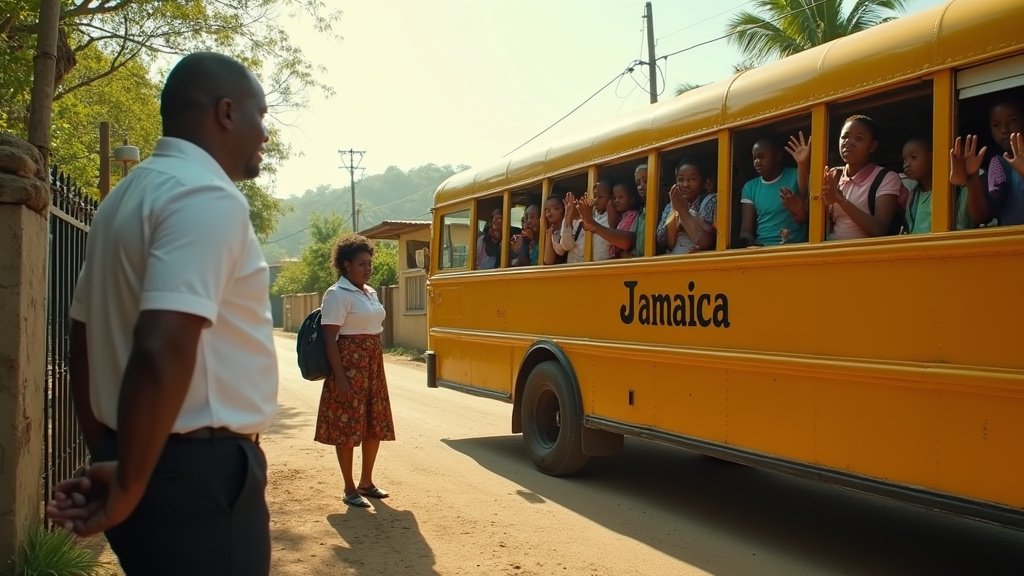Jamaica has officially rolled out its highly anticipated National Rural School Bus Programme, marking a significant step towards ensuring equitable and safe transportation for students across the island. The programme, which commenced on Monday, September 8, 2025, aims to address decades-old challenges of high transportation costs, inadequate services, and safety concerns for children in rural communities.
Addressing a Critical Need
The introduction of the National Rural School Bus Programme is a flagship initiative driven by the Jamaican government’s commitment to improving access to education. For too long, students in rural areas have faced arduous journeys to school, often walking long distances or relying on costly and sometimes unsafe public transport. The programme, spearheaded by the Ministry of Science, Energy, Telecommunications and Transport in collaboration with the Ministry of Education, Skills, Youth and Information, seeks to alleviate these burdens, thereby boosting school attendance, punctuality, and overall academic performance. Prime Minister Dr. Andrew Holness has described the initiative as “transformational,” emphasizing its role in not only providing safe passage but also fostering discipline and positive values among students.
Phase One Deployment Underway
Phase one of the National Rural School Bus Programme officially commenced with the deployment of 60 buses to operate along 55 designated rural routes. These buses are set to serve approximately 258 rural schools, benefiting thousands of students islandwide. This initial rollout is part of a larger plan to eventually equip all 858 rural schools with dedicated transportation. An additional 40 buses are slated for gradual introduction between September and November 2025, with plans to expand the fleet to 300-400 buses within the next three years.
Safety and Affordability at the Forefront
Each bus in the new fleet has undergone rigorous inspections and meets international safety standards, with modifications such as repositioning doors to the left side to enhance passenger safety. The programme incorporates modern features including GPS tracking accessible to parents, speed limiters, onboard surveillance cameras, geofencing for route monitoring, and a cashless payment system. Following an initial free period in September and October 2025, students will pay a flat fare of $50 per trip. This subsidized rate is expected to represent substantial savings for families, who previously spent upwards of $300 to $600 per child daily for transportation. Notably, 12 buses are specifically assigned to serve special needs institutions in the first phase, with further provisions planned.
Stakeholder Voices and Initial Challenges
The rollout has garnered support from key stakeholders, including the National Parent-Teacher Association of Jamaica (NPTAJ) President, Stuart Jacobs, who has long advocated for such a system, especially after tragic incidents involving student safety in public transport. Education Minister Dr. Dana Morris Dixon has defended the programme as a “game-changer,” urging for its depoliticisation and highlighting the safety standards of the buses. However, the first day of operation was not without its challenges. Reports indicated that only 53 of the planned 60 buses were deployed due to minor accidents and driver-related issues. Some areas also experienced bus “no-shows” on the inaugural day, leading to students seeking alternative transport, though the Minister of Transport, Daryl Vaz, acknowledged that the first week serves as a “test week” for the new system, with adjustments to be made. [User’s initial context, 18, 28]
The Opposition People’s National Party (PNP) has voiced criticism, questioning the age and suitability of the buses and alleging safety risks. Conversely, the Jamaica Teachers’ Association (JTA) President, Mark Malava, has raised concerns about the effective monitoring of students on these rural routes. [User’s initial context]
A Glimpse into Jamaica’s Future
Despite initial operational hurdles, the National Rural School Bus Programme represents a significant investment in Jamaica’s future. By prioritizing the safety, affordability, and reliability of student transportation, the government aims to dismantle barriers to education and ensure that no child is left behind due to logistical challenges. The successful implementation of this news programme is expected to have a profound, positive impact on educational equity and the overall well-being of students across Jamaica.

